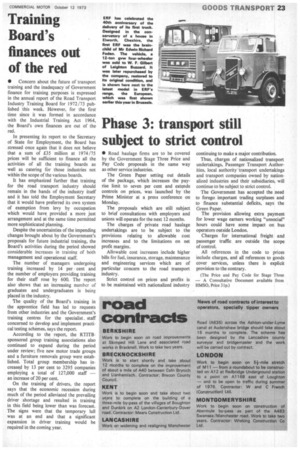Training Board's finances out of the red
Page 25

If you've noticed an error in this article please click here to report it so we can fix it.
• Concern about the future of transport training and the inadequacy of Government finance for training purposes is expressed in the annual report of the Road Transport Industry Training Board for 1972/73 published this week. However, for the first time since it was formed in accordance with the Industrial Training Act 1964, the Board's own finances are out of the red.
In presenting its report to the Secretary of State for Employment, the Board has stressed once again that it does not believe that a sum of £35 million at 1974/75 prices will be sufficient to finance all the activities of all the training boards as well as catering for those industries not within the scope of the various boards.
It has emphasized further that training for the road transport industry should remain in the hands of the industry itself and it has told the Employment Secretary that it would have preferred its own system of exemption from levy by occupation which would have provided a more just arrangement and at the same time permitted more sophisticated planning.
Despite the uncertainties of the impending changes brought about by the Government's proposals for future industrial training, the Board's activities during the period showed considerable increases in training of both management and operational staff.
The number of managers undergoing training increased by 14 per cent and the number of employers providing training for their staff rose by 600. The report also shows that an increasing number of graduates and undergraduates is being placed in the industry.
The quality of the Board's training in the apprentice field has led to requests from other industries and the Government's training centres for the specialist, staff concerned to develop and implement practical testing schemes, says the report.
According to the report, the RTITB sponsored group training associations also continued to expand during the period under review; five new motor trade groups and a furniture removals group were estab lished. Total group membership has increased by 13 per cent to 3295 companies employing a total of 127,000 staff — an increase of 20 per cent.
On the training of drivers, the report says that the economic recession during much of the period alleviated the prevailing driver shortage and resulted in training in this field being lower than was forecast. The signs were that the temporary lull was at an end and that a significant expansion in driver training would be required in the coming year.




















































































































